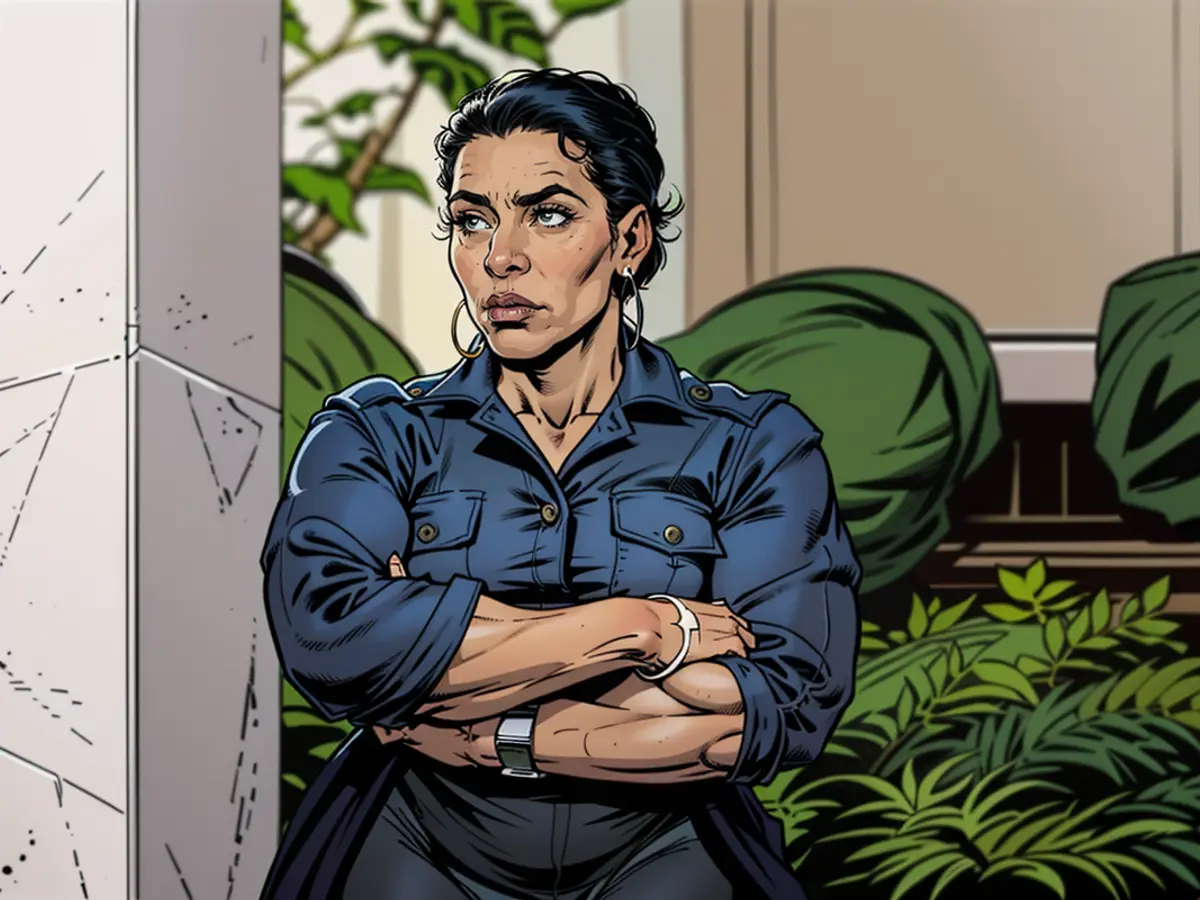She faced accusations of homicide following a miscarriage. A South Carolina woman shares her narrative.
"Apologies for the delay in dispatching the documents," the officer wrote in an email. "However, I now have the completed report and wanted to schedule a meeting with you and your partner next Wednesday afternoon for a follow-up discussion."
Marsh recognized that the situation revolved around her miscarriage that occurred in March. She shared her experience of unexpectedly giving birth in the middle of the night while using the bathroom in her off-campus apartment during her second trimester. She recalled the bathroom being soaked in blood and her panicking and screaming.
"I couldn't breathe," Marsh, now 23, said.
Following her ordeal, Marsh woke up in the hospital where an officer interrogated her. Several weeks later, she was informed that she could collect her daughter's ashes. It was then that she became aware of the criminal investigation against her. Three months after the miscarriage, Marsh faced charges of murder/homicide by child abuse, as per the law enforcement records. She was detained at the Orangeburg-Calhoun Regional Detention Center for 22 days without any bail and faced a potential sentence of 20 years to life in prison.
By August, thirteen months post-release from jail with an ankle monitor, Marsh was exonerated by the grand jury, and her case was dismissed.
Marsh's story brought attention to the problems in reproductive rights, healthcare disparities, and the practice of pregnancy criminalization, particularly affecting black women such as herself. This is noticeable in the current political climate, over a year post-Dobbs v. Jackson Women’s Health Organization Supreme Court decision, which allowed states to ban abortions.
Marsh's case also highlighted the potential impact of the November elections. According to a recent survey conducted by KFF, a significant majority (61%) of voters support the enactment of a federal law that restores countrywide abortion rights. The midterm elections' outcome could factor into the White House and Congress control, with topics surrounding abortion likely to come into the political hot seat in the ten states where ballot initiatives on abortion are to be decided.
According to U.S. Rep. James Clyburn, a South Carolina State University graduate and Democrat whose congressional district includes Orangeburg, "This is not just a slogan when we talk about this being an 'election about the restoration of our freedoms.'"
"I was terrified"
Marsh's home pregnancy test result in November 2022 resulted in panic and fear. "I didn't know what to do, I didn't want my parents to be disappointed around me," she said, leaving her in a state of shock.
There was no prenatal care, she said, as she continued to have her period delusionally, thinking that the test may have been faulty.
Based on an incident report submitted by the Orangeburg County Sheriff's Office on the day of her miscarriage, Marsh allegedly scheduled an appointment in January 2023 at a Planned Parenthood clinic in Columbia to procure the Plan-C pill, which could potentially induce abortion. However, the report does not specify if she procured or took the drug.
During an interview at her parent's house, Marsh denied visiting Planned Parenthood or taking any induction drugs. "I've never been in any sort of trouble, or been arrested, or gotten a ticket," she said.Marsh held a position in the marching band as the clarinet section leader and even performed at Carnegie Hall. She was majoring in biology and aimed to become a doctor in college.
South Carolina state Rep. Seth Rose, a Columbia-based Democrat and one of Marsh's attorneys, called the case a "really sad" situation. "Our belief is that she experienced a natural miscarriage," he stated.
Marsh recalled experiencing intense abdominal pain on February 28, 2023, which was far more severe than regular menstrual cramps. She went to the emergency room but remained for several hours without receiving treatment. Upon returning home, her pain escalated. She sought medical help again but was transported to the hospital by an ambulance.
Hospital staff crowded around her, but she claimed they didn't explain the details to her. "I was scared," she said.
According to the report submitted by the sheriff's department, hospital staff told Marsh that she was pregnant and that they detected a fetal heartbeat. Herrified and bewildered, Marsh left the hospital the second time and her pain subsided.
Once again, she experienced intense pain in the middle of the night, prompting her to use the bathroom. Revealingly, she delivered her infant girl in the toilet. "I screamed because I was terrified, as I didn't know what was happening," she said.
Her boyfriend at the time dialed 911, and the emergency dispatcher repeatedly advised her to remove the infant from the toilet. However, she was unable to do so due to her emotional vulnerability.
The first medical responders revealed potential signs of life and attempted to administer life-saving measures as they rushed her to Regional Medical Center in Orangeburg, the incident report stated. At the hospital, Marsh learned that her child had not survived.
"I kept asking to see the baby," she said hopefully. "They wouldn't allow it."
The following day, a sheriff's deputy informed Marsh in her hospital room that her situation was under investigation but assuringly told her she was not in any legal trouble at the time. Marsh expressed that she didn't feel guilty about any wrongdoing.
Over 10 weeks had passed since Marsh received odd texts from a police officer in mid-May, and there was no hint in those messages that the subsequent meeting regarding the final report was a matter of urgency.
The officer wrote to Marsh, as shared with KFF Health News, "It doesn't have to be Wednesday, it can be next week or another week." He added, "I just need to meet with you in person before I can wrap up the case. I'm truly sorry."
Marsh replied, "No worries, I get it."
She didn't inform her parents or consider legal counsel. "I didn't think I needed one," she explained.
Marsh scheduled a meeting with the officer for June 2, 2023. During this encounter, she was apprehended. Her boyfriend was not charged.

Herman Marsh, a band director at a local school in Orangeburg, initially thought it was a prank when reality set in. "I told my wife, 'We need to get a lawyer now,'" he said.
Criminalization of Pregnancy
When Marsh lost her pregnancy on March 1, 2023, women in South Carolina could still obtain an abortion up to 20 weeks past fertilization, or gestational age of 22 weeks.
However, later that spring, South Carolina's Republican-controlled legislature passed a ban, prohibiting providers from performing abortions once fetal cardiac activity can be detected, with exceptions for cases of rape, incest, or when the mother's life is at risk. This law does not impose criminal penalties on women seeking or obtaining abortions.
Solicitor David Pascoe, a Democrat representing South Carolina's 1st Judicial Circuit, handled Marsh's prosecution. He stated that the issues of abortion and reproductive rights were not connected to this case.
The arrest warrant alleged that failing to move the infant from the toilet at the dispatcher's request was the primary cause of her daughter's death. The warrant cited "respiratory complications" due to premature delivery and a maternal chlamydia infection as secondary causes of death. Marsh claimed she was unaware of the infection until post-pregnancy loss.
Pascoe asserted that investigators questioned if Marsh failed to render aid to the infant before the emergency responders arrived at the apartment. Ultimately, the grand jury decided there wasn't sufficient evidence to pursue a criminal trial, he said. "I respect the grand jury's decision."
Marsh's case is a prime example of how pregnancy loss can swiftly turn into a criminal investigation, according to Dana Sussman, senior vice president of Pregnancy Justice, a nonprofit tracking such cases. Although similar cases preceded the Supreme Court's Dobbs decision, Sussman noted that they seem to be increasing.
Local and national anti-abortion groups seized on Marsh's story when her name and mugshot were published online by The Times and Democrat of Orangeburg. Holly Gatling, executive director of South Carolina Citizens for Life, published a blog post titled, in part, "Orangeburg Newborn Dies in Toilet," which was published by National Right to Life. Gatling and National Right to Life did not respond to interview requests.
Marsh admitted to regrettably googling herself after her release from jail. "It was heartbreaking to see all those things. I cried countless times," she said.
Various physicians are also apprehensive about being labeled as criminals. Physicians for Human Rights published a report on September 17 about Florida’s six-week abortion ban, which included input from two dozen doctors who expressed fear about the criminal penalties imposed by the law.
Michele Heisler, medical director for the nonprofit, stated, "The healthcare systems are afraid. There are numerous gray areas. So everyone is being extra cautious. Unfortunately, patients suffer as a result."
Chelsea Daniels, a family medicine doctor from Planned Parenthood in Miami who performs abortions, said in early September, she saw a patient who had a first-trimester miscarriage. The patient had visited four hospitals and presented ultrasound scans from each facility.
Daniels said, "No one would touch her. Each ultrasound scan she brought in represents, on the other side, a really scared doctor who is doing their best to interpret the murky legal language around abortion care and miscarriage management, which are essentially the same things."
Florida is one of ten states with an abortion-related ballot initiative in November, making it the only Southern state with such an initiative. Others include Montana, Missouri, and Maryland.
"I found my strength"
Zipporah Sumpter, one of Marsh's lawyers, said the law enforcement system treated her client as a criminal instead of a grieving mother. "This is not a criminal matter," Sumpter said.
It wasn't just the tense climate surrounding pregnancy that caused Marsh to suffer; "race definitely played a role," Sumpter stated, believing Marsh did not receive compassionate care at the hospital, not once, nor twice.
The management of Regional Medical Center, where Marsh was treated, changed shortly after her hospitalization. Now managed by the Medical University of South Carolina, its spokesperson declined to comment on Marsh's case.
Get CNN Health's weekly newsletter
- Sign up here to get The Results Are In with Dr. Sanjay Gupta every Friday from the CNN Health team.
Historically, the delivery outcomes for Black women in Orangeburg County, where Marsh tragically lost her pregnancy, have been among the poorest in South Carolina. From 2020 up until 2022, the infant mortality rate for Black infants born in Orangeburg County was over three times higher than the average statewide rate for white infants.
At present, Marsh is still grappling with the events that unfolded. She chose to move back in with her parents and started attending therapy sessions. She has enrolled in classes at a nearby community college with plans to re-enroll at South Carolina State University to attain a four-year degree. Her goal remains the same – to become a doctor. She keeps her daughter's ashes on a bookshelf in her bedroom.
"Despite everything, I discovered my resilience. I discovered my voice. I wish to assist other young women who find themselves in the same predicament as me and those who will in the near future," she shared. "I've always had faith that God would be by my side, but I never knew how the contemporary justice system would fare in my case."
KFF Health News Florida correspondent Daniel Chang aided in creating this article.
KFF Health News is a dedicated newsroom producing in-depth coverage on health-related issues, forming a key component of KFF's operations – an independent and reliable source for health policy research, polling, and journalism.

After her traumatic experience, Marsh's focus shifted towards seeking better healthcare services. She shared, "I want to advocate for improved access to healthcare, especially for women of color, to ensure no one else experiences what I went through."
During her legal battle, Marsh's case highlighted the importance of discussing healthcare policies and the decriminalization of pregnancy outcomes. She said, "I hope my story sparks conversation about the need for legal reforms in pregnancy care and reproductive justice, ensuring healthcare is not criminalized."








